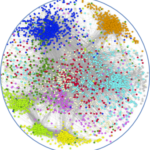Lien vers Pubmed [PMID] – 28500258
EMBO Rep. 2017 07;18(7):1231-1247
Spermatogenesis is associated with major and unique changes to chromosomes and chromatin. Here, we sought to understand the impact of these changes on spermatogenic transcriptomes. We show that long terminal repeats (LTRs) of specific mouse endogenous retroviruses (ERVs) drive the expression of many long non-coding transcripts (lncRNA). This process occurs post-mitotically predominantly in spermatocytes and round spermatids. We demonstrate that this transposon-driven lncRNA expression is a conserved feature of vertebrate spermatogenesis. We propose that transposon promoters are a mechanism by which the genome can explore novel transcriptional substrates, increasing evolutionary plasticity and allowing for the genesis of novel coding and non-coding genes. Accordingly, we show that a small fraction of these novel ERV-driven transcripts encode short open reading frames that produce detectable peptides. Finally, we find that distinct ERV elements from the same subfamilies act as differentially activated promoters in a tissue-specific context. In summary, we demonstrate that LTRs can act as tissue-specific promoters and contribute to post-mitotic spermatogenic transcriptome diversity.


